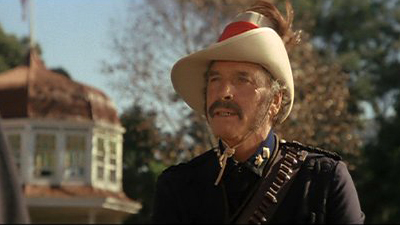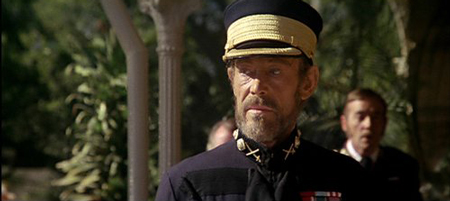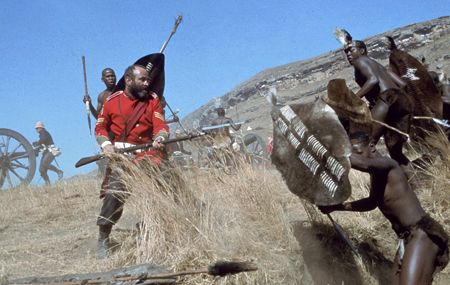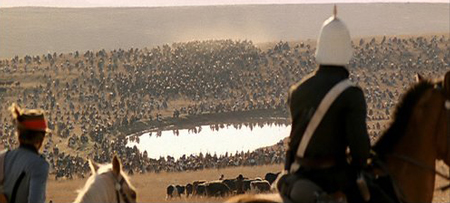
 |
|
|
|
England's colonial history has received mostly uncritical treatment in the movies, establishing an image of a noble English army spreading civilization to distant, underdeveloped lands. In 1964, the 70mm English Road Show spectacle Zulu thrilled audiences with its stirring account of the desperate stand of a few English soldiers against a horde of African warriors. The popular film honors military tradition by showing the Zulus breaking off the battle with a salute to a noble enemy. The screen had to wait fifteen years before Zulu's director Cy Endfield co-wrote a far more critical epic about the Zulu Wars, a fascinating prequel produced on a far larger scale and even more accurate in its historical detail. With its stellar cast and intelligent script, 1979's Zulu Dawn is also one of the best movies ever made about 'asymmetrical warfare' ... when a modern army was defeated by native troops at a fateful battleground called Isandlwana. 
The story begins in 1879, as English colonists in South Africa conspire to start a war of conquest. Overreaching their authority, Sir Henry Bartle-Frere and Lord Chelmsford (John Mills of Ryan's Daughter & Peter O'Toole of Lawrence of Arabia) launch an invasion from Natal into Zululand. King Cetshwayo (Simon Sabela) has no choice but to muster his 40,000 warriors in defense. Although the invading force numbers only about 3,000 British soldiers, general Chelmsford is confident that his troops' firepower will easily repel an enemy armed only with spears. Pacifist Bishop Colenso (Freddie Jones of The Elephant Man) is advised to mind his own business, while his daughter Fanny (Anna Calder-Marshall) must say goodbye to her two suitors. The one-armed Colonel Durnford (Burt Lancaster) commands a troop of native mounted cavalry, and Lt. William Vereker (Simon Ward of Frankenstein Must Be Destroyed) is a gentleman farmer eager to defend his land. The local Boers consider Chelmsford's attack plan foolhardy, and even the cynical quartermaster Bloomfield (Peter Vaughan) fears the formidable horde of asagai-wielding Zulus. Among Chelmsford's loyal commanders are Colonel Pulleine (Denholm Elliott of A Room with a View) and Irish packmaster Col. Hamilton-Browne (Nigel Davenport of No Blade of Grass). Tough color sergeant Williams (Bob Hoskins of The Cotton Club) and Chelmsford's fussy aide Colonel Crealock (Michael Jayston of Nicholas and Alexandra) officiate over the invasion from opposite ends of the chain of command. The force crosses the Buffalo River into enemy territory, convinced that the Zulu will easily be defeated. The original Zulu shows a massive Zulu army attacking a tiny outpost guarding the border of The British Colony of Natal. Zulu Dawn winds the clock back a few days to reveal the larger context of the conflict, which is far less glamorous. The focused screenplay by Endfield and Anthony Story repeatedly points up the arrogance and folly of the British invaders. To hog the glory of conquering Zululand, Lord Chelmsford rejects the advice of the Africa-savvy Col. Durnford. He also dismisses inconvenient reports that the Zulu impis (regiments) are massing not far away. The Zulus dispatch expendable 'spies' to purposely be captured, and after savage beatings 'volunteer' false information. King Cetshwayo even sacrifices a small force of older warriors just to give the invaders a false sense of security. Newspaper correspondent Norris Newman (Ronald Lacey of Raiders of the Lost Ark) annoys Chelmsford by questioning his motive for the invasion. Even the English virtue of grace under pressure is criticized, when Col. Crealock upbraids an officer for excess emotion when reporting the impending massacre of over a thousand soldiers in arms. 
For the young officers, the incursion inspires poetic joy: "What a marvelous spree!" One of them shoots a teenage Zulu found tending cattle, just for sport. The Brits allow native bearers to drown by the score in a thoughtlessly dangerous river crossing. Lord Chelmsford sits down for a camp lunch served on fine China, while his infantry is forced to march a full day without food. Zulu depicted fewer than 200 soldiers defending a tiny outpost, whereas Zulu Dawn fields an enormous, historically accurate expeditionary force. Backed by a terrific music score by Elmer Bernstein, most every scene from the half-hour mark is laid out on a vast scale. Long lines of marching soldiers and cavalry cover the landscape. When the fateful battle arrives, the orderly lines of British marksmen can see miles across the slope of a hill, as a human wave of thousands of Zulus move in their direction. Chelmsford has split his troops into two groups, leaving one at Isandlwana under his least experienced commander. The feeling of impending calamity is as strong as that in Titanic: we can see for ourselves how everything is going wrong for the British invaders under attack. Artillery shells explode directly into the Zulu mass, but the charging horde keeps coming. The large-caliber British rifle bullets have a devastating effect, cutting down Zulus by the hundreds, yet the charge is not broken. Armchair generals will squirm to discover, when the enemy is breaching the battle lines, that the supply of English ammunition is still sealed in metal tins inside sturdy wooden boxes. As one frightened soldier says, "these guns run out, and those spears don't". 
The battle is doubly traumatic. The enemy comes faster than the soldiers can reload; Zulu warriors can run through the rough brush almost as fast as a horse can. We identify with the overwhelmed Brits even as we know that the Zulus are entirely justified in defending their homeland against the more modern aggressor. The failure of the enemy to withdraw becomes unnerving. There is no possibility of truce or surrender. If the warriors close in with those sharp, spade-like swords, it's all over. Zulu Dawn is possibly the most complex and detailed battle action movie this side of Sergei Bondarchuk's Russian epic War and Peace. Modern viewers accustomed to spectacles pasted together with computer generated pixel-people armies may not appreciate the film's incredible battle vistas. While individual soldiers fight hand-to-hand in the foreground, we can see down the hill as literally thousands of real extras clash in the far distance. Scene after scene shows the British ranks overwhelmed by sheer numbers. Mixing awe with panic, Zulu Dawn generates a strong emotional response in its viewers. In addition to the late Simon Ward, Zulu Dawn features a fistful of notable actors. Bob Hoskins would soon become a household name; he got so sick on location that he barely recovered in time to film his breakout gangster role in The Long Good Friday. Phil Daniels of Quadrophenia and David Bradley of Kes have standout parts as young soldiers. Ken Gampu, Cornel Wilde's principal pursuer in The Naked Prey, is an imposing African in the employ of the British command. Severin's Blu-ray of Zulu Dawn is the first widescreen (Panavision) release of the film in Region 1 home video. All previous U.S. transfers have been pan-scanned with bad color, but Severin's HD encoding conveys the full might of the film's imagery. Ousama Rawi's color cinematography takes full advantage of the massive pageantry of warfare, and Elmer Bernstein's music score greatly enhances the threat of the advancing Zulus. Quentin Tarantino "quoted" the score in his eclectic war film Inglourious Basterds. The Blu-ray audio track is encoded in two-channel Dolby mono. 
Good disc extras for vintage titles have almost become a thing of the past, but Severin has put together three excellent new interview featurettes, taped in South Africa. Historian Ian Knight gives an absorbing account of the real history of the Zulu Wars and the Battle of Isandlwana, the worst defeat ever dealt to the British Army by native troops. A second featurette is a lengthy reminiscence by the film's technical advisor Midge Carter, who took over from historical expert John Mollo. His memories are amusing, especially when he describes the film's official director Douglas Hickox as a man who slowed up production and ended up being largely ignored. Carter instead credits the film's crack second unit and assistant directors with pulling the massive battle scenes together in record time. A third extra takes Ian Knight to the actual battle location, to describe the action against the backdrop of the real terrain. Also included are an original trailer and a lengthy gallery of work print outs. We can see Bob Hoskins and David Bradley improvising various combat scenarios, and hear an angry assistant director scream for a crewperson in modern dress to get out of camera range. Severin's Zulu Dawn is one of the most desirable Blu-ray discs of the year so far.
On a scale of Excellent, Good, Fair, and Poor,
Zulu Dawn Blu-ray rates:
Reviews on the Savant main site have additional credits information and are often updated and annotated with reader input and graphics. Also, don't forget the 2011 Savant Wish List. T'was Ever Thus.
Review Staff | About DVD Talk | Newsletter Subscribe | Join DVD Talk Forum |
| ||||||||||||||||||